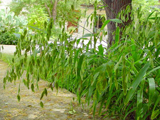Native Plants

Q. Who is Mr. Smarty Plants?
A: There are those who suspect Wildflower Center volunteers are the culpable and capable culprits. Yet, others think staff members play some, albeit small, role. You can torture us with your plant questions, but we will never reveal the Green Guru's secret identity.
Did you know you can access the Native Plant Information Network with your web-enabled smartphone?
Ask Mr. Smarty Plants is a free service provided by the staff and volunteers at the Lady Bird Johnson Wildflower Center.

rate this answer
Saturday - June 12, 2010
From: Woodlawn, TN
Region: Southeast
Topic: Erosion Control
Title: Erosion control for steep creek bank in Tennessee
Answered by: Nan Hampton
QUESTION:
I have creek bank erosion problems in Woodlawn, Tennessee, northwest of Nashville. What plants can I place there. The bank is approximately 12ft almost vertical.ANSWER:
We recommend grasses for controlling erosion because of their extensive fibrous root systems that serve to hold the soil in place. However, seeding grass is not the whole process. The seeds need moisture to germinate. If the moisture comes in the form of rain, it is likely to wash the seeds down your steep bank before that have a chance to germinate and take root. One possible solution is to use an erosion control blanket. The erosion-control fabric works by slowing the runoff water and allowing sediments to fall out rather than be washed away. Seeds are sown under the erosion-control material and grow up through the matting when they germinate. You can also insert plants into the soil by cutting through the matting. The roots of the plants that are growing through the erosion-control material anchor the soil to stop the erosion. If you use erosion-control blankets made of biodegrable material, they will eventually disappear leaving the plants to control the problem. Many nurseries carry this erosion control fabric.
Here are some candidate grasses and sedges native to your area. Since I don't know all the growing conditions (e.g., available sun and moisture) at your site, you should check the GROWING CONDITIONS section for each species to determine if it is suitable for your site:
Andropogon virginicus (broomsedge bluestem)
Carex blanda (eastern woodland sedge)
Chasmanthium latifolium (Inland sea oats)
Eragrostis intermedia (plains lovegrass)
Muhlenbergia schreberi (nimblewill)
Here are some other plants that you could use on the bank.
Artemisia ludoviciana (white sagebrush)
Conoclinium coelestinum (blue mistflower)
Cephalanthus occidentalis (common buttonbush) would do well at the base of the bluff on the edge of the creek.
Ferns would work in mostly shady areas. Here are a few suggested ones.
Dryopteris marginalis (marginal woodfern)
Osmunda cinnamomea (cinnamon fern)
More Erosion Control Questions
Economical, low maintenance plants for erosion control on a bank
May 29, 2006 - Please advise of all species suitable for preventing bank erosion, specifically those that will cover a southern exposure 400 foot long, 15 foot high bank in western North Carolina that grows rapidly ...
view the full question and answer
Erosion Control in Bartlesville OK
May 10, 2012 - What kind of plants can we use to stop erosion and loss of bank on a creek that is mostly shaded? Is there any free advice/plants for people that are losing land due to water levels rising/dropping?
view the full question and answer
Plants to stop creek bank erosion in North Carolina
June 26, 2009 - Hi:
I live in NC where most of the dirt is clay based. I have a small creek behind my house that is eroding. The creek overflows when there is a heavy rain and as a result, gradual erosion. My g...
view the full question and answer
Revegetating a hillside in western Washington state
October 10, 2012 - Removing several downed trees across my dock demolished the native plants growing on the hillside and the contractor pulled out their remains. The area faces east on an open freshwater bay. Close to...
view the full question and answer
Limiting erosion around pond from Brooklyn Park MN
May 20, 2013 - Minnesota resident, wants to find plant limit erosion from pond?
view the full question and answer
| Support the Wildflower Center by Donating Online or Becoming a Member today. |

